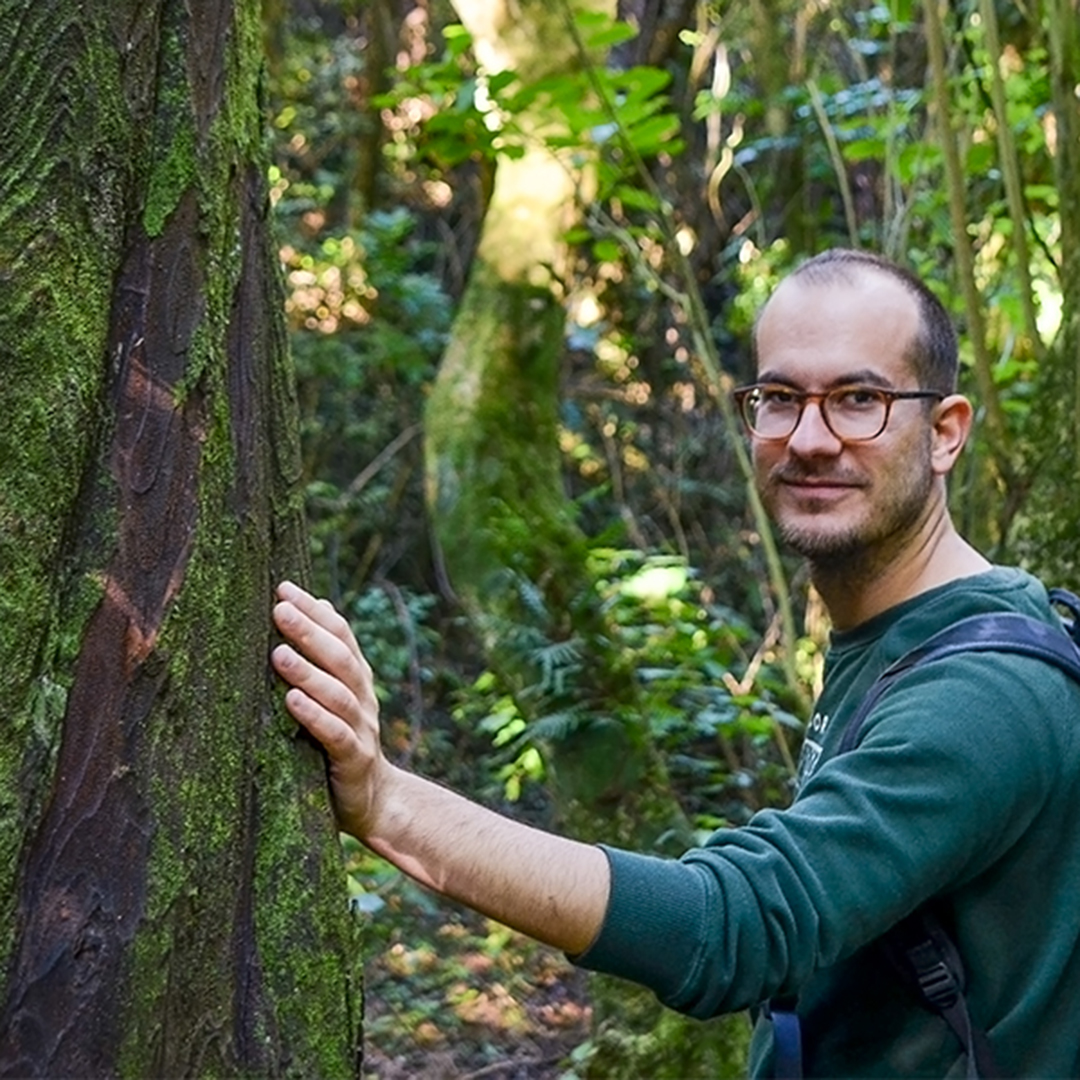Research Themes
Sustainable agriculture
Can we reduce the environmental impact of agriculture by making smarter choices about how we grow food, by finding natural ways to control pests, and by supporting the natural microorganisms that support plants?
Wildlife conservation
How do things like habitat connectivity and land disturbance affect wildlife. We study animals, including local songbirds, cougars, and bears, as well as more exotic species like Galapagos tortoises.
Microbiome, diet, & health
How does the interaction of nutrition, microbiome, and our immune system affect diabetes, heart disease, and inflammatory bowel disease?
Neurodegenerative disease
How do the cells of the nervous system maintain and repair themselves, and how do errors in these processes lead to Alzheimer’s disease, ALS, and other conditions?
Genomics
How can we use the revolution in DNA sequencing to better understand how cells, organisms, and ecosystems function?
Wine, Cannabis, Lavender
How do local yeasts affect wine fermentation? How do plants like cannabis and lavender make flavours and medicines?
Plant-Insect Interactions
How do insects respond to the signals plants make? How can we better manage pests of fruit trees?
Microbiology
How do bacterial and fungal communities impact lakes, soil, and human health?
Biodiversity
How can we monitor and support biodiversity, and protect it from invasive species and human impacts?
CENTRES, INSTITUTES AND LABS
Our centres, institutes and labs form the foundation of our research efforts. Our faculty members work with many community and industry partners to advance knowledge in the biological sciences and provide students with hands-on research and learning opportunities.
The Barker lab studies cellular decisions that regulate life and death decisions in the normal and damaged nervous system. We combine genetics with cell and molecular biology to study and decipher conserved intracellular pathways in model systems ranging from flies to rodents. Learn more.
Lavenders are a diverse group of species in the mint family with over 40 different species and many more cultivars within these species. We are interested in the molecular, cellular, biochemical and environmental factors that regulate the quality and quantity of aromas and essential oils produced by lavendar, and in improving crop plants through biotechnology. Learn more.
Our researchers are interested in invasive species ecology and biocontrol; the origins of diversity patterns among freshwater diatoms; the influence of regional/historical processes on community assembly; and historical/biogeographical perspectives on associations between plants and mycorrhizal fungi. Learn more.
Our objective is to develop solutions to difficult and unsolved environmental issues. Our achievements are the result of collaborations between faculty and students with backgrounds in the disciplines of chemical, civil, electrical, and mechanical engineering, as well as chemistry and biology.
Human modification of the environment, including large-scale habitat conversion and soaring greenhouse gas emissions, pose major threats to global biological diversity. Maintaining species’ ability to persist in changing environments ultimately means preserving genetic variation underlying ecologically important traits. Work in our lab is at the interface of ecology and evolution, investigating the genetics of adaptation, life history variation, speciation, population history and phylogeography. Learn more.
The Facility for Environmental and Biological Imaging provides state-of-the-art confocal microscopy services to members of the UBC community and external researchers.
Services include training and advice on imaging needs, as well as the use of the facility’s instruments, including the Olympus FluoView FV10i, Olympus FluoView FV1000, and Zeiss Axioimager. Learn more.
Modern food systems connect us biophysically and socially. They are also key contributors to many of our most pressing sustainability issues, from local through global scales. The Food Systems Priority Research for Integrated Sustainability Management (PRISM) Lab is a hub for cross-cutting research at the intersection of food system sustainability measurement and management. Learn more.
The Okanagan Institute for Biodiversity, Resilience, and Ecosystem Services (BRAES) is a group of over 30 faculty members and their graduate students working in ecology, biodiversity and conservation, and environmental sustainability on UBC’s Okanagan campus. BRAES’ special strength is its multidisciplinary focus, with members from departments of biology, mathematics and statistics, literary and cultural studies, earth and environmental sciences, physical geography, economics and creative arts. Learn more.
We are concerned with the metabolism of isoprenoids in plants, more specifically, the molecular, cellular, biochemical, and environmental factors that regulate the quality and quantity of aromas and essential oils produced by herbal and medicinal plants. Current work focuses on identification, cloning, and characterization of structural and regulatory genes that are involved in the biosynthesis, inter- and intracellular trafficking, secretion and storage of monoterpenes in plants cells specialized for secondary metabolite production. Learn more.
The PALEO LAB specialises in the use of midge fossils for the reconstruction of past environmental changes, particularly glacial and postglacial climates, and recent human impacts on lake ecosystems. We collaborate extensively with researchers at universities across Canada, as well as Parks Canada and the Royal British Columbia Museum. Learn more.
From food security and forest renewal to the development of novel bio-fertilizers and compostable plastics, UBC Okanagan’s plant growth facility will expand the research capacity of our scholars to work collaboratively to benefit the social and economic health of our region. Learn more.
PlantSMART investigates the chemicals produced by plants and how plant chemicals affect human health. Research themes include: chemistry of cannabis and other medicinal plants; plant chemistry for food security; chemistry of natural non-protein amino acids; chemical regulation of plant signalling behaviour; chemistry of plant responses to light. Learn more.
Across the Earth, human modification of the environment has never been so widespread as it is today. The Wildlife Restoration Ecology Lab (WiRE Lab) is addressing the impact of human activity on the interactions among large predators (wolves, bears, cougars), their prey (deer, elk), and plants, in human-modified landscapes. We use a combination of field experiments, GPS tracking, computer models, and satellite imagery to bring together the ecology of individuals, populations, and communities. Learn more.
We study the biophysics of cells at the single molecule and single cell levels. Our studies address fundamental cell biology questions that have many practical applications from smart DNA-based biomaterials to cell screening technology. Learn more.
The Gibson lab’s goal is to treat disease-associated microbiomes using genetically engineered microbial medicines (GEMMs) that promote rebiosis in the gut. The Gibson lab has created platforms of live biotherapeutic products for the treatment of inflammatory bowel disease and other co-morbidities. Learn more.

Experts
Search for Irving K. Barber Faculty of Science faculty members with the right expertise.
Opportunities for Undergraduate Students
The Department of Biology offers many opportunities for undergraduate students to gain valuable research experience. You can participate in research either as a volunteer research assistant, or through Directed Studies and/or Honours opportunities. Explore your options and apply below.
The opportunity: Get experience helping faculty members, graduate students, or a mixture of the two, with their research projects. Students can participate in lab-based or field research, at study sites in diverse forests, grasslands, lakes and rivers, and agroecosystems. This is a non-paid, non-credit based opportunity that will give you the chance to participate in various elements of conducting research. The duties and length of the opportunity is determined by the supervising faculty member.
Prerequisites: Typically, no experience is required, but some research labs may require students to have previous research experience. Some opportunities may also require the completion of certain courses prior to volunteering. Consult your program advisor or a faculty member for more information.
The opportunity: Carry out your own research project under the supervision of a faculty member in biology, biochemistry and molecular biology, ecology and evolutionary biology, or microbiology. You can earn three or six credits, depending upon the project.
Prerequisites: Third-year standing and permission of a faculty member to supervise the project. Some majors require additional approvals. Limit of 9 credits per academic year. Consult your program advisor or a faculty member for more information.
Directed Studies Application Forms
Biochemistry and Molecular Biology: BIOC 448
Biology: BIOL 452
The opportunity: Investigate a research problem under the supervision of a faculty member. You will be involved in all aspects of the research process, such as research design, data collection, and data analysis. Presenting findings is another key component of research, and this option requires completion of a written report and a public presentation of your research findings.
Completion of the undergraduate honours thesis contributes six credits towards your degree, but does not guarantee an honours distinction. To receive the honours distinction, you will also need to satisfy all of the graduation requirements including, but not limited to, a minimum average of 75% in all courses, and a minimum grade of 75% on your honours thesis.
Prerequisites: These vary by major, but all require fourth-year standing, a minimum average of 75% in all courses taken, and a research supervisor. Consult your program advisor or a faculty member for more information.
Honours Thesis Application Forms
Biochemistry and Molecular Biology Honours Thesis
Biology Honours Thesis
Awards for Undergraduate Students
The Department of Biology and the Irving K. Barber Faculty of Science offer a number of awards to support exceptional research experiences for students at UBC’s Okanagan campus.
The Undergraduate Research Awards (URA), NSERC Undergraduate Student Research Awards (USRA), and the Rogers Family Charity Trust Award in Biology all provide opportunities for undergraduate students to pursue innovative and original research as part of their learning experience.
Our Partners and Donors
Together, we are making a difference, locally and around the world. Our partners and donors allow us to carry out our mission of helping the community, making advancements in biological research, and providing quality education in the in the biological sciences.
If you are interested in becoming a partner or donor, we would love to hear from you.





